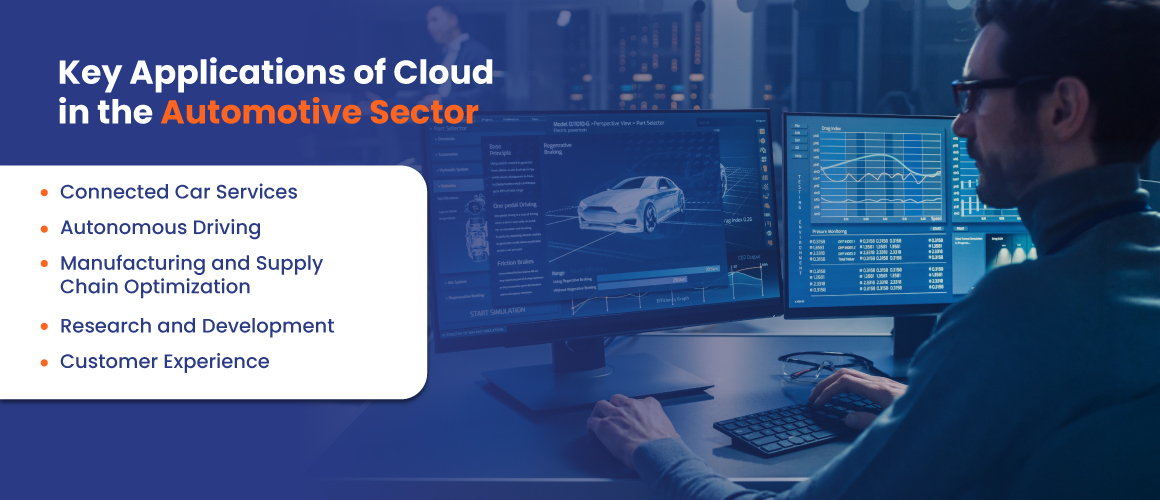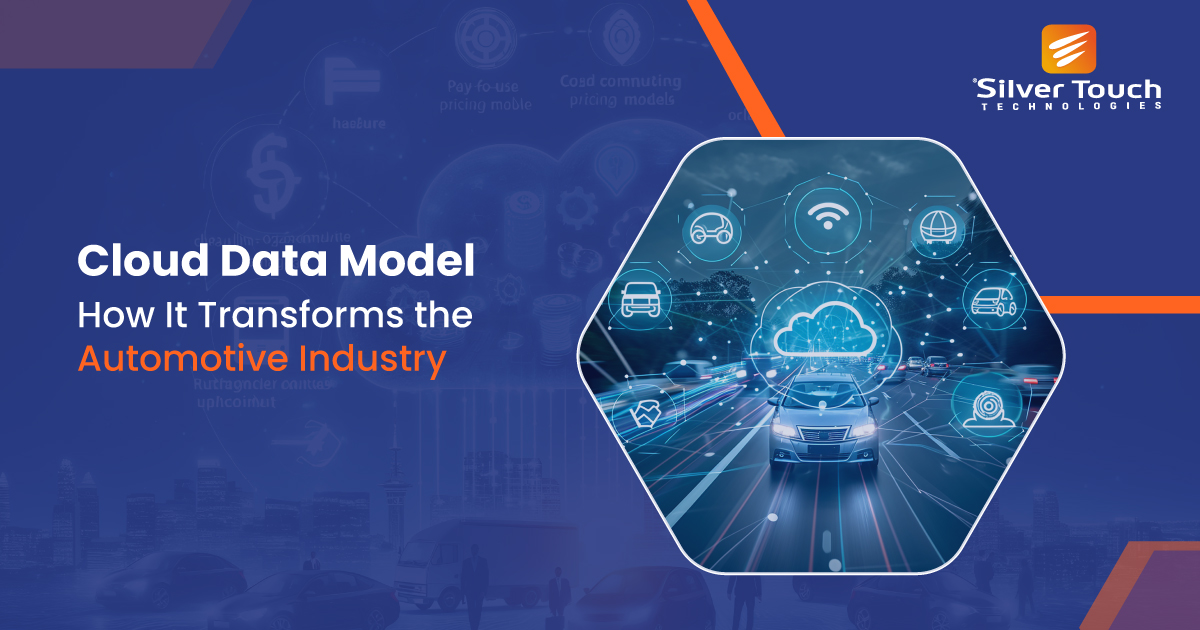The automotive industry faces many challenges, including economic issues, geopolitical tensions, changing customer demands, and market trends. Automotive manufacturers need to implement innovative yet powerful solutions to meet these challenges effectively. Here, the automotive cloud comes into the picture. On one hand, it brings scalability, and on the other hand, it can open the doors of innovation for this complex automotive industry.
In this post, we will dig deep into the role of the cloud in the automotive sector. But before moving ahead, let’s understand the current challenges of this industry.
Brief Overview of the Current Challenges in Automotive Industry
The first and foremost challenge of the automotive industry sector is to reduce time-to-market for new vehicles while meeting the customer’s expectations. This needs an innovative approach, sophisticated designs, and robust testing capabilities. Moreover, managing costs remains a big challenge for automotive manufacturers amid the economic crisis and increasingly intricate development cycles.
Geopolitical issues, material scarcity, and logistical bottlenecks are other major challenges that can disrupt production schedules that leading to failure in meeting deadlines. Moreover, stringent laws and regulations related to emissions with greater transparency can remain challenging for manufacturers. All these challenges make it essential to keep the automotive sector ready for the future.
Need for Future-Proofing in the Automotive Industry
Future-proofing is a necessity to survive and thrive in the automotive industry sector. Evolving consumer expectations and an unpredictable global supply chain with rapid technological advancements are drivers for making the automotive industry ready for the future. It is fair to mention that automotive companies may fall behind competitors without taking a proactive approach in future-proofing.
Anticipating a paradigm shift towards EVs and autonomous driving with connected services through software is a future trend. These trends require reevaluation of traditional business models and manufacturing lifecycles. Let’s discuss the role of the automotive cloud in making the sector future-proof through key applications.
Understanding Cloud Technologies
Cloud technologies refer to the services, models, and deployment options that enable computing resources to be delivered over the Internet instead of being hosted on-premises. These technologies offer benefits like high scalability, flexibility, cost-effectiveness, and global accessibility.
Various cloud service models are- IaaS (Infrastructure as a Service)- Examples are Microsoft Azure and Google Compute Engine
- PaaS(Platform as a Service)- Examples are AWS Elastic Beanstalk and Google App Engine
- SaaS (Software as a Service)- Examples are Salesforce and Google Workspace
Talking about cloud deployment models, we can mention public cloud, private cloud, multicloud, and hybrid cloud. All these types are based on the location of the cloud infrastructure and ownership.
Containers, serverless computing (Function as a Service), and Edge Computing are popular cloud technologies. Other related technologies like AI, ML, and IoT are highly compatible with cloud computing.
Key Applications of Cloud in the Automotive Sector
Cloud technology revolutionizes the automotive industry by offering scalable and data-driven solutions at different stages of the manufacturing lifecycle. Here are some of the top applications of cloud for the automotive industry sector

Connected Car Services
Cloud Managed Services mapping and traffic data ensure that drivers get the most accurate and real-time information. Remote diagnostics, predictive maintenance, and over-the-air (OTA) updates can make connected cars more advanced and useful. Cloud platforms can also contribute to in-car entertainment and personalized user experience.
Autonomous Driving
Developing self-driving cars requires immense computational power with vast amounts of data. Cloud technology provides automotive manufacturers with data ingestion, simulation, testing, and AI/ML model training. Automotive cloud data models are useful in empowering autonomous driving algorithms.
Manufacturing and Supply Chain Optimization
Cloud solutions are useful for transforming automotive manufacturing and logistics by offering more supply chain visibility and resilience. Moreover, demand forecasting and cloud-based visual inspection systems can help detect any issues. Cloud-powered SCM (Supply Chain Management) platforms provide end-to-end visibility across the entire process.
Research and Development
Automotive cloud data models are useful in the research and development (R&D) lifecycle. These models can promote collaboration at a global level and establish synchronization between design and engineering teams. Furthermore, cloud HPC (High-Performance Computing) provides on-demand access to massive computing power for complex simulations.
Customer Experience
Cloud can enhance customer engagement and streamline dealership processes. Automotive manufacturers can offer personalized customer services and establish digital showrooms using this technology. Moreover, DMS (Dealership Management System), based on the cloud, can streamline dealership operations like sales, service scheduling, etc.
Benefits of Embracing Cloud in Automotive
Automotive cloud solutions offer significant benefits to the industry. They can address several major challenges and bring benefits, including
Higher Cost-Efficiency and Scalability
Cloud computing is highly cost-efficient and scalable. It can save operational and other costs for the automotive sector by offering multiple models. High scalability enables automotive companies to grow faster without spending a small fortune.
Support for Innovation
Automotive cloud solutions can enhance visibility and flexibility in the manufacturing process. It also gives actionable insights based on the analysis of massive data. Altogether, manufacturers can make their R&D process more advanced and launch innovative vehicles.
Better Collaboration
Cloud technology can improve collaboration across remote and global teams. As every engineer and automotive designer can access the necessary data in real-time, it is possible to work in sync to make innovative products.
Improved Decision-Making
Real-time data insights with high visibility across the entire manufacturing process can improve the decision-making process. Manufacturers can also make decisions based on the customer experience and in-house department-related data.
More Security and Resilience
The cloud can ingest and process massive volumes of data from connected vehicles and manufacturing lines. This enables manufacturers to gain the advantage of predictive maintenance with data security.
Challenges and Considerations
While cloud adoption remains beneficial for the automotive sector, it is better to address some challenges and considerations before implementing these solutions.
One of the biggest challenges is data security and privacy protection. Automotive companies deal with highly sensitive data, including intellectual property like vehicle designs and proprietary manufacturing processes. It is, therefore, essential to protect this data from cyber threats and unauthorized access.
Other challenges include integration complexity and data migration. Automotive companies need to manage every aspect of cloud implementation properly to leverage its benefits.
Vendor lock-in and cost management are crucial considerations. Selecting the right cloud strategy, managed service provider, and managing cloud costs are also essential. Finally, skill gaps and cultural shifts are other important considerations before implementing cloud solutions.
The Road Ahead- Strategic Recommendations
Effective implementation of cloud technology in the automotive sector needs a strategic and holistic approach. Here we mention some key recommendations- Develop a Clear Strategy in line with Business Goals
You can start by defining objectives and identifying cloud-native opportunities to meet them. You can make a roadmap containing workloads and applications with priorities and timelines to get a clear idea.
- Focus on Data Security and Compliance from Day One
Security-first mindset and adherence to relevant regulations like ISO 27001 and TISAX for automotive-specific security are imperative. It is also necessary to understand the shared responsibility model of the cloud.
- Establish a Cloud-First Culture in the Company
Upskilling and reskilling the workforce with the recruitment of dedicated cloud professionals is necessary to establish a cloud-first culture. You can also encourage cross-functional collaboration between teams.
- Optimize Costs and Manage Vendor Relationships
Effective cost management and proper cloud strategy can help you optimize costs. Strategic partnerships and smooth vendor relationships are necessary to ensure seamless long-term operations.
- Follow Innovative and Data-Driven Approach
Establishing data governance policies for cloud environments and leveraging AI/ML technologies with a focus on Edge computing can help automotive companies follow a data-driven approach with innovation.
Concluding Remarks
The cloud is the backbone of the automotive sector. Whether manufacturers want to introduce high-end connected cars or autonomous vehicles, automotive cloud solutions are essential. However, this technology brings some challenges with many benefits, and therefore, it is better to consult a reputable cloud services provider to make the most of the cloud.
Silver Touch Technologies Canada is a trusted cloud managed services provider. We offer customized automotive cloud solutions based on your business requirements and other related aspects. Contact us to learn more about automotive cloud data models and the scope of cloud technology for your business.
FAQs
Cloud technologies improve automotive manufacturing by enabling real-time data analysis from production lines, optimizing supply chain management, and facilitating predictive maintenance.
Digital twins are virtual replicas of physical assets or processes. They leverage cloud computing for simulation, performance monitoring, and predictive analysis of vehicles or manufacturing plants.
Yes, cloud solutions are secure enough for automotive companies, as major cloud providers offer robust security features, compliance certifications, and encryption protocols.
Cloud technologies support sustainability in the automotive industry by optimizing energy consumption in manufacturing processes, enabling efficient fleet management for reduced emissions, and facilitating data analysis.



